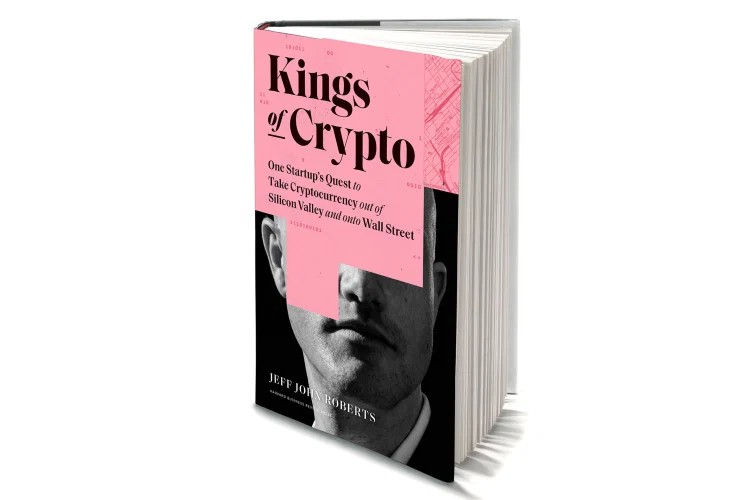
在他的新书《加密货币之王:一家初创公司试图将加密货币从硅谷带到华尔街》中,《财富》杂志资深作家骆杰峰(Jeff John Roberts)描绘了数字货币交易所Coinbase的迅速崛起。Coinbase已成为比特币和其他加密货币交易的主要平台,且该公司在这一过程中引发了很多争议。在这一背景下,骆杰峰捕捉到了,在Coinbase的早期阶段,将这一金融科技初创公司与其在华尔街树大根深的竞争对手区分开来的巨大文化鸿沟。
亚当•怀特在空军和哈佛商学院见识了很多东西。自从加入Coinbase成为第五号员工以来,他已经升职成为GDAX的主管。GDAX是Coinbase的交易所,为专业加密货币交易商提供服务。现在,2017年秋季,GDAX已经成为一棵摇钱树,因为Coinbase的年收入已达到10亿美元,而怀特已经做好了迎接新挑战的准备。他认为他可以处理商界给他带来的任何挑战。Coinbase的CEO布赖恩•阿姆斯特朗将坎特•菲茨杰拉德公司推荐给了他。
这家著名的公司符合华尔街俱乐部文化的所有刻板印象。在坎特•菲茨杰拉德公司工作意味着身穿背带裤和三件套西装,意味着花几个小时在昂贵的牛排晚餐和精美的苏格兰威士忌上,吹嘘自己赚多少钱。
对于全球最富有、最高端的众多公司来说,坎特作为一家一流银行和经纪公司符合其声誉,在那里工作也意味着享有令人垂涎的地位。坎特是纽约联邦储备银行指定担任联邦证券做市商的为数不多的几家公司之一,这意味着其担任美国政府的债券经纪人。
现在,怀特的工作是向坎特推销加密货币的好处,鼓励其与Coinbase做生意。他希望,这家神话般的公司愿意接受Coinbase的帮助,为其客户提供比特币,或者愿意听怀特解释区块链(加密货币背后的技术)未来会如何改变证券清算流程。与此同时,与坎特的合作将给这家初创公司带来荣誉,而要使许多人认为不光彩的加密货币行业被人们所接受,还有很长一段路要走。
怀特在俯瞰中央公园的59号街的一个塔楼上会见了该公司的代表。很长一段时间以来,坎特•菲茨杰拉德公司的总部曾位于世贸中心北塔的顶层,在2001年9月11日一架波音767客机撞到了顶层下方5层楼的位置。该公司为此损失了658名员工,占其纽约员工的三分之二,其中包括CEO霍华德•卢特尼克的兄弟。第二周,卢特尼克将该公司的交易市场重新上线,挽救了公司,并最终向在袭击中丧生的员工家属赔付了抚慰金。
现在,卢特尼克站在一群坎特员工的前面,这些员工曾会见过怀特。而怀特并未带一群人来。他保持着比土生土长的加州人更友好、谦逊和随和的姿态。卢特尼克很快注意到怀特没有打领带,到的时候并未带随行人员。然后,他看了下怀特名片上的职务:总经理。
在硅谷,职务——如衣服——通常是非正式的,有时还带有些创造性,比如“数字先知”或“创新夏尔巴人”。许多初创公司将职务视为一排连帽衫——从衣架上取下一个,试穿一下,然后再试另一个,最后找一个自己感到舒服的。另一方面,在老牌金融公司里,取得重大成就的员工会赢得“食人鱼”这样的绰号,这些公司将职务视为权力和地位的关键标志。像“执行总经理”和“高级总经理”这样的头衔很重要。这些头衔会发出重要信号,表明谁值得投入时间,谁需要重视,谁可以被忽视。卢特尼克嘲笑说,Coinbase竟然会派一个“总经理”——不管是什么——来浪费他的时间。他们不知道他是谁吗?
怀特回忆道:“因此,我与这家有着高明手腕的大金融公司负责人坐下来,试图达成交易。”他们肯定有十几个人,而我只有自己一个人。然后,这位CEO嘲笑我,然后说:“嘿,总经理,你要帮我煮咖啡吗?”我来到纽约,被老派交易商收拾地很惨。”
怀着羞辱,怀特回家了,没有为Coinbase获得任何一个新客户。但是他会笑到最后。一年后,他将加入由华尔街巨头洲际交易所(Intercontinental Exchange)发起的新加密货币合资企业,并在不久后成为其总裁——这表明即使是最传统的纽约金融公司也开始采用加密货币。(财富中文网)
经哈佛商业评论出版社许可转载。摘自杰夫•约翰•骆杰峰的《加密货币之王:一家初创公司试图将加密货币从硅谷带到华尔街》。©2021年杰夫•约翰•骆杰峰。版权所有。
译者:郝秀
审校:汪皓
在他的新书《加密货币之王:一家初创公司试图将加密货币从硅谷带到华尔街》中,《财富》杂志资深作家骆杰峰(Jeff John Roberts)描绘了数字货币交易所Coinbase的迅速崛起。Coinbase已成为比特币和其他加密货币交易的主要平台,且该公司在这一过程中引发了很多争议。在这一背景下,骆杰峰捕捉到了,在Coinbase的早期阶段,将这一金融科技初创公司与其在华尔街树大根深的竞争对手区分开来的巨大文化鸿沟。
亚当•怀特在空军和哈佛商学院见识了很多东西。自从加入Coinbase成为第五号员工以来,他已经升职成为GDAX的主管。GDAX是Coinbase的交易所,为专业加密货币交易商提供服务。现在,2017年秋季,GDAX已经成为一棵摇钱树,因为Coinbase的年收入已达到10亿美元,而怀特已经做好了迎接新挑战的准备。他认为他可以处理商界给他带来的任何挑战。Coinbase的CEO布赖恩•阿姆斯特朗将坎特•菲茨杰拉德公司推荐给了他。
这家著名的公司符合华尔街俱乐部文化的所有刻板印象。在坎特•菲茨杰拉德公司工作意味着身穿背带裤和三件套西装,意味着花几个小时在昂贵的牛排晚餐和精美的苏格兰威士忌上,吹嘘自己赚多少钱。
对于全球最富有、最高端的众多公司来说,坎特作为一家一流银行和经纪公司符合其声誉,在那里工作也意味着享有令人垂涎的地位。坎特是纽约联邦储备银行指定担任联邦证券做市商的为数不多的几家公司之一,这意味着其担任美国政府的债券经纪人。
现在,怀特的工作是向坎特推销加密货币的好处,鼓励其与Coinbase做生意。他希望,这家神话般的公司愿意接受Coinbase的帮助,为其客户提供比特币,或者愿意听怀特解释区块链(加密货币背后的技术)未来会如何改变证券清算流程。与此同时,与坎特的合作将给这家初创公司带来荣誉,而要使许多人认为不光彩的加密货币行业被人们所接受,还有很长一段路要走。
怀特在俯瞰中央公园的59号街的一个塔楼上会见了该公司的代表。很长一段时间以来,坎特•菲茨杰拉德公司的总部曾位于世贸中心北塔的顶层,在2001年9月11日一架波音767客机撞到了顶层下方5层楼的位置。该公司为此损失了658名员工,占其纽约员工的三分之二,其中包括CEO霍华德•卢特尼克的兄弟。第二周,卢特尼克将该公司的交易市场重新上线,挽救了公司,并最终向在袭击中丧生的员工家属赔付了抚慰金。
现在,卢特尼克站在一群坎特员工的前面,这些员工曾会见过怀特。而怀特并未带一群人来。他保持着比土生土长的加州人更友好、谦逊和随和的姿态。卢特尼克很快注意到怀特没有打领带,到的时候并未带随行人员。然后,他看了下怀特名片上的职务:总经理。
在硅谷,职务——如衣服——通常是非正式的,有时还带有些创造性,比如“数字先知”或“创新夏尔巴人”。许多初创公司将职务视为一排连帽衫——从衣架上取下一个,试穿一下,然后再试另一个,最后找一个自己感到舒服的。另一方面,在老牌金融公司里,取得重大成就的员工会赢得“食人鱼”这样的绰号,这些公司将职务视为权力和地位的关键标志。像“执行总经理”和“高级总经理”这样的头衔很重要。这些头衔会发出重要信号,表明谁值得投入时间,谁需要重视,谁可以被忽视。卢特尼克嘲笑说,Coinbase竟然会派一个“总经理”——不管是什么——来浪费他的时间。他们不知道他是谁吗?
怀特回忆道:“因此,我与这家有着高明手腕的大金融公司负责人坐下来,试图达成交易。”他们肯定有十几个人,而我只有自己一个人。然后,这位CEO嘲笑我,然后说:“嘿,总经理,你要帮我煮咖啡吗?”我来到纽约,被老派交易商收拾地很惨。”
怀着羞辱,怀特回家了,没有为Coinbase获得任何一个新客户。但是他会笑到最后。一年后,他将加入由华尔街巨头洲际交易所(Intercontinental Exchange)发起的新加密货币合资企业,并在不久后成为其总裁——这表明即使是最传统的纽约金融公司也开始采用加密货币。(财富中文网)
经哈佛商业评论出版社许可转载。摘自杰夫•约翰•骆杰峰的《加密货币之王:一家初创公司试图将加密货币从硅谷带到华尔街》。©2021年杰夫•约翰•骆杰峰。版权所有。
译者:郝秀
审校:汪皓
In his new book, Kings of Crypto: One Startup’s Quest to Take Cryptocurrency Out of Silicon Valley and Onto Wall Street, Fortune senior writer Jeff John Roberts depicts the rapid rise of Coinbase, the digital currency exchange. Coinbase has become one of the dominant platforms for the trading of Bitcoin and other cryptocurrencies, and the company has generated plenty of controversy along the way. In this scene, Roberts captures the wide cultural gap that separated the fintech upstart and its entrenched Wall Street competitors in Coinbase's earlier days.
Adam White had seen a lot of things in the Air Force and at Harvard Business School. And since joining Coinbase as employee number five, he had risen to run GDAX, the company’s exchange for professional cryptocurrency traders. Now, in the fall of 2017, GDAX had become a cash cow as Coinbase steamed toward $1 billion in annual revenue, and White was ready for a new challenge. He figured he could handle anything the business world threw at him. Coinbase’s CEO, Brian Armstrong, threw Cantor Fitzgerald at him.
The famous firm embodied every stereotype of Wall Street’s clubby culture. Working at Cantor Fitzgerald meant wearing suspenders and three-piece suits. It meant spending hours over expensive steak dinners and fine scotch, braying about how much money you made.
And as befit Cantor’s reputation as an A-list banking and brokerage firm for many of the world’s wealthiest and most sophisticated companies, working there also meant enjoying a coveted status. Cantor is one of only a handful of firms that the Federal Reserve Bank of New York has designated to act as a market maker for federal securities, which means acting as Uncle Sam’s bond broker.
It was now White’s job to sell Cantor on the benefits of crypto and doing business with Coinbase. The fabled firm, he hoped, might want Coinbase’s help in offering Bitcoin to its clients or perhaps hear White’s explanation of how blockchain—the technology underlying cryptocurrency—could one day transform the process for clearing securities. Meanwhile, a tie-up with Cantor would be a feather in the startup’s cap and go a long way toward legitimizing a crypto industry many still saw as disreputable.
White met reps from the firm on 59th Street in a tower overlooking Central Park. Cantor Fitzgerald’s headquarters had long been located at the top of the World Trade Center’s North Tower until a Boeing 767 jet stuck the building five floors below them on September 11, 2001. The firm lost 658 employees—two-thirds of its New York workforce—including the brother of CEO Howard Lutnick. Defiantly, Lutnick brought the firm’s trading markets back online the next week, saving the company and eventually paying out benefits to relatives of employees killed in the attack.
Now, Lutnick stood at the head of a phalanx of Cantor staff who had come to meet White. White did not meet phalanx with phalanx. He brought the friendly, self-effacing, and easygoing disposition of a native Californian and little more. Lutnick quickly noticed White wore no tie and arrived with no retinue. And then he saw the title on his business card: General Manager.
In Silicon Valley, titles—like clothes—are often informal, sometimes creative, like “Digital Prophet” or “Innovation Sherpa.” Many startups treat titles like a rack of hoodies—pull one off the rack, try it on, try another. Find one you’re comfortable with. Old-line finance firms, on the other hand, where high achievers earned nicknames like “Human Piranha,” treat titles as critical badges of power and status. Ranks like “executive managing director” and “senior managing director” matter. They send important signals about who is worth investing time in, who is serious, and who can be ignored. Lutnick scoffed at the idea that Coinbase would send a “general manager”—whatever that was—to waste his time. Didn’t they know who he was?
“So I sat down with this big, sharp-elbowed financial company, trying to work a deal,” White recalls. “There must have been a dozen of them and there was just me. Then the CEO laughs at me and goes, ‘Hey, GM, are you going to make my coffee?’ I came out to New York and got my ass handed to me by old-school traders.”
Humiliated, White went home without a new client for Coinbase. But he would get the last laugh. One year later, he would join a new cryptocurrency venture launched by Wall Street giant Intercontinental Exchange, becoming its president soon after—a sign that even the most traditional New York financial firms were coming around to crypto.
Reprinted by permission of Harvard Business Review Press. Excerpted from Kings of Crypto: One Startup’s Quest to Take Cryptocurrency Out of Silicon Valley and Onto Wall Street, by Jeff John Roberts. © 2021 Jeff John Roberts. All rights reserved.






